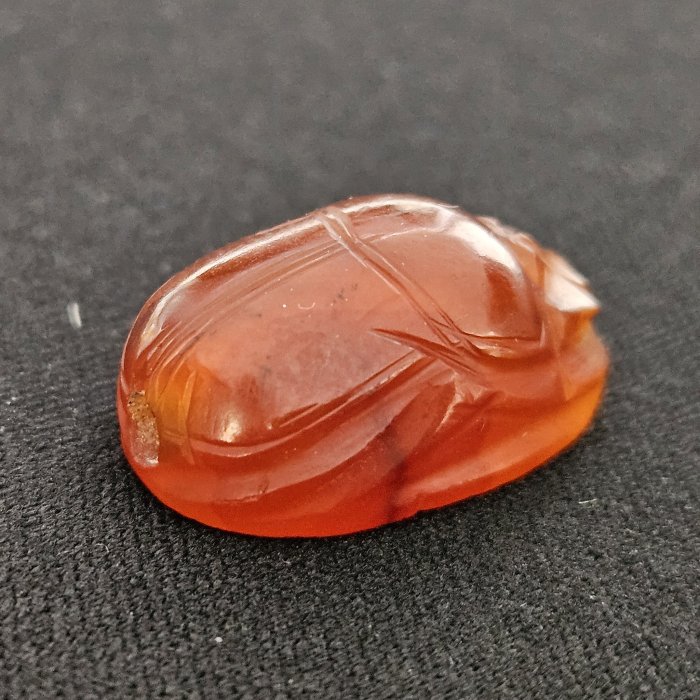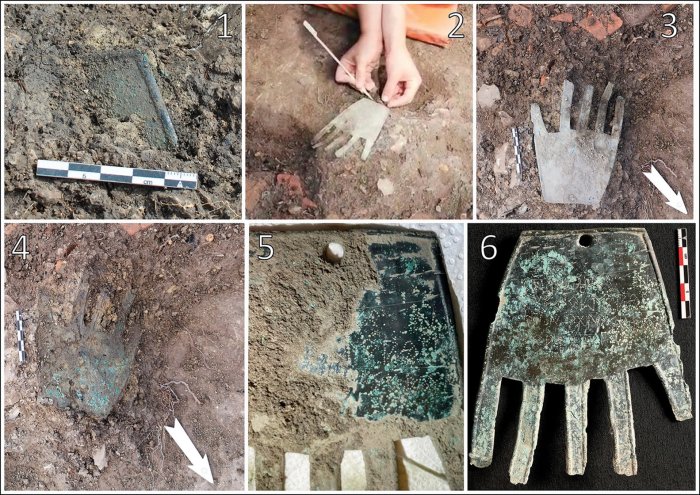A. Sutherland – AncientPages.com – Bees are among the most recognized insects, highlighted in ancient myths and folklore of many cultures worldwide. Both bees and honey have accompanied humanity since the dawn of time. Often called one of the ‘most hard-working’ animals, bees have been known not only for collecting pollen and producing honey.
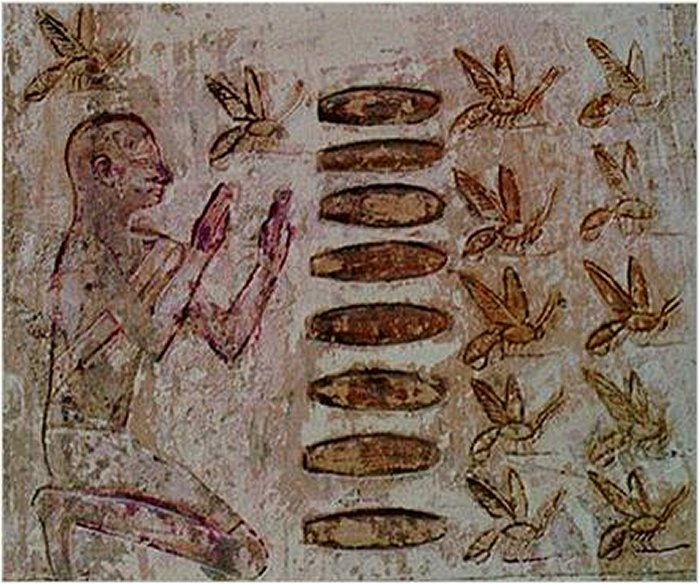
Visualization of honey harvest in tube sticks. This picture was taken in the sun temple of Niuserre in Abusir. Image credit: John – Andrew Ginsbury – Public Domain
They were also believed to be divine messengers.
People have bred bees throughout the history of humanity, probably since the time of the ancient Egyptians and Greeks. Traditionally, bees are often ᴀssociated with magic and their honey as a divine gift.
Greek and Roman myths and legends mention these modest and unremarkable insects frequently. In the beliefs of beekeepers, Egypt is the homeland of beekeeping, and the Egyptians thought that the bee flew out of the horns of the Holy Bull, Apis, the most important and highly regarded bull deity of ancient Egypt. It is worth noting that this ancient myth originates from its Latin name, Apis mellifera.
Originally, Apis was a god of fertility and later served as an intermediary between humans and other powerful deities like Ptah, Osiris, and Atum.
Additionally, in ancient Egypt, bees symbolized the Lower Kingdom of Egypt and the united kingdoms of Egypt in later times. People believed the first bees were created from the tears of the sun god Ra as they fell upon the desert sand.
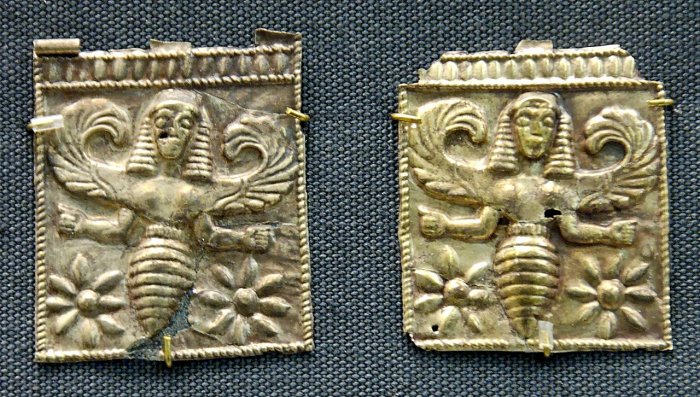
Gold plaques embossed with winged bee goddesses, perhaps the Thriae or an older goddess, found at Camiros, Rhodes, dated to the 7th century BCE (British Museum). Credits: Unknown artist – Jastrow – Public Domain
Egyptian hieroglyphs describe how to use beehives. We find the earliest known reference to beekeeping on the walls of the Egyptian sun temple of Ni-user-re at Abusir, dated to about 2400 BC. Scientists think this ancient Egyptian interest in beekeeping probably evolved due to the belief that the bee originated from the Sun god, Ra.
Hebrew, Greek, and Hindu mythologies did not ignore the importance of bees and honey, and in Mayan mythology, Ah-Muzen-Cab is one of the Maya gods of bees and honey. In the Popul Vuh, the sacred book of the Maya Indians, one of the legendary Maya Hero twin gods, Xbalanque, is also ᴀssociated with bees and beekeeping under the name or aspect of Mok Chi’.
Famous and essential is ancient guidance given by King Solomon, who is said to have ruled Israel after King David and was renowned for his wisdom and riches. Solomon said: “eat honey, son, for it is good and will prolong the days of your life.”
Honey was supposed to come from the underworld. On the other hand, Pliny claimed that sweat always fell from the sky before dawn.
Beliefs in the importance of bees come from Indian myths and legends and Aegean and Near East cultures. The people in these parts believed the bees were sacred insects that connected the natural world to the underworld. The pᴀssage, unharmed by swarming bees in the Greek countryside, was considered a sign of virginity and purity.
Ancient Greeks had several gods ᴀssociated with bees in their pantheon; evidently, prophecy in this ancient land was often related to bees.
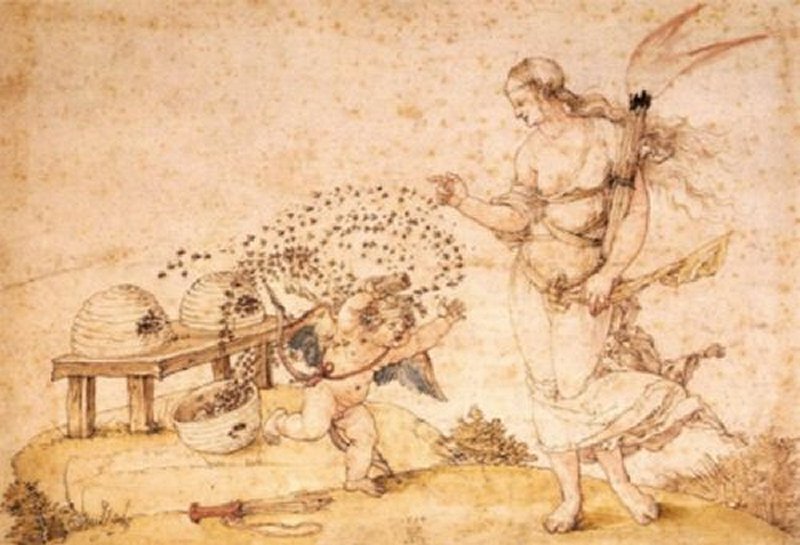 Cupid the Honey Thief by Albrecht Durer, 1514. Credit: Public Domain
Cupid the Honey Thief by Albrecht Durer, 1514. Credit: Public Domain
In one of the Homeric Hymns dated 600-500 BC, Hermes confirms that Apollo’s gift of prophecy first came to him from the Thriae, three bee-maidens known as Naiads.
The Naiads (freshwater nymphs) originated from the sacred springs of the Corycian Cave of Mount Parnᴀssus in Phocis, at 1.360 m. and above the town of Delphi and the bees’ patrons.
Their depictions showed them with women’s heads, torsos, and lower bodies and wings of a bee.
These pre-Hellenic bee goddesses in the Aegean offered Apollo the gift of prophecy.
The folk wisdom from ancient European cultures also gives some good advice regarding these insects, saying that they must know about all the crucial events in the family, like weddings and funerals. Otherwise, they will leave the hive, follow the deceased, or become extinct.
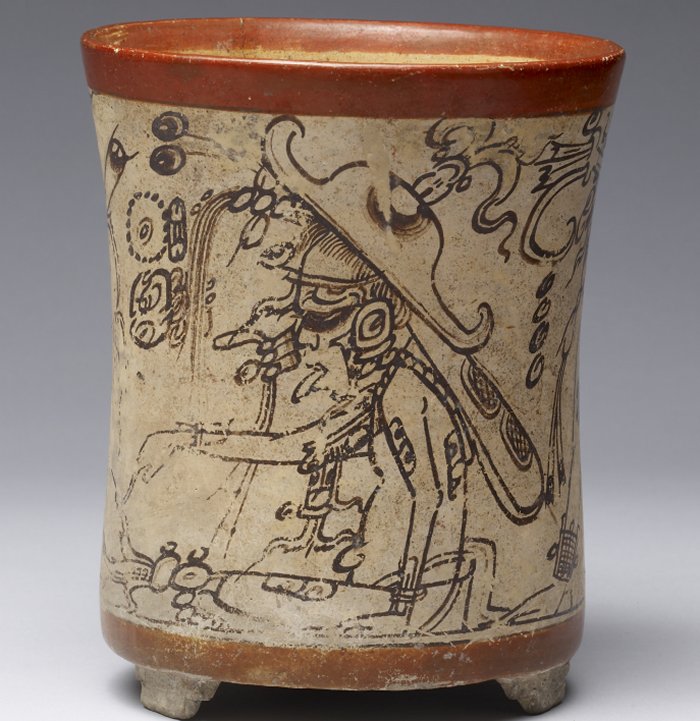
Mok Chi’, the patron deity of beekeepers, on a codex-style Maya vessel. – Public Domain
In European folklore traditions, it was essential to contact bees in their hive, inform them about events in the family (especially births and deaths), and remember their existence by bringing them a piece of wedding cake.
This friendly atтιтude was vital to keep them content and happy in their hive, and this old and popular custom has its name: “Telling the bees.”
In Biblical legends, bees were “little servants of God” and the first inhabitants of the biblical heaven. Christianity has even seen similarities between bees and Christ-just like the savior, they die (fall asleep for the winter) and rise again (wake up in the spring).
The ancient gods not only ennobled bees making them their divine messengers. They did the same med honey, which in legends was the food of the sun. In Greek mythology, it was a component of nectar, the drink of the Olympian gods, and Ambrosia, their food. Honey is traditionally given to the spirits of the ᴅᴇᴀᴅ.
The Babylonians and Persians used honey – as a symbol of eternal happiness – to embalm corpses. The Greeks put the honey cake into the graves and the pain in the deceased’s mouth. It was supposed to bribe the guardian of the underworld, Cerberus.
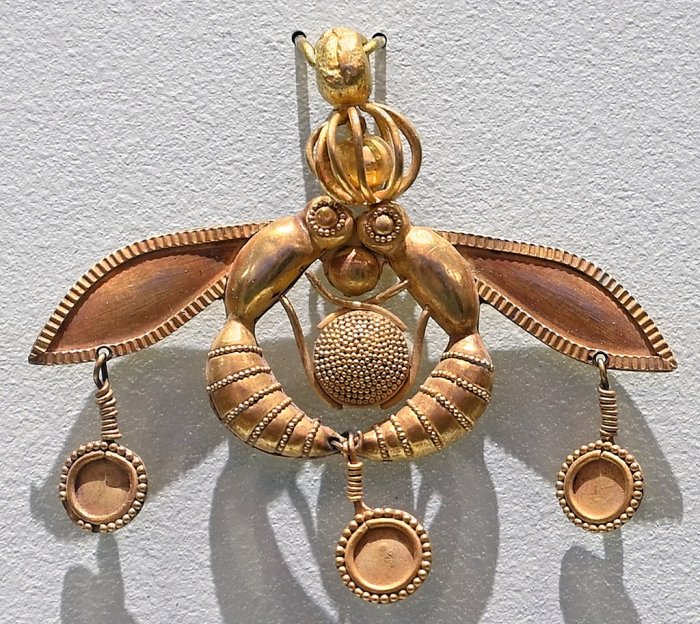
Bee pendant excavated from the Minoan Chrysolakkos necropolis at Malia, 1800-1700 BC, Isle of Crete, Greece. The pendant consists of two bees depositing a drop of honey in their honeycomb. They are holding the round honeycomb between their legs and the drop of honey in their mouths. On their heads, the bees carry a delicate cage containing a golden bead. Small discs hang from their wings and stings. Size (width) 4.6 cm. Archaeological Museum of Heraklion: Image credit: – CC BY-SA 4.0
This article cannot mention all the characteristics of bees and give many examples of how crucial they are to people and nature. It is worth noting that these creatures are considered the embodiment of human souls, and as such, they are not allowed to kill or curse.
The ancient writer Lucius Columella (1st century), a Roman soldier, farmer, and prominent writer on agriculture in the Roman Empire, stated that bees, naturally pure, recognize liars and other depraved individuals.
However, their appearance may indicate death. According to one of the ancient beliefs ᴀssociated with these insects, if they are born in the house’s living quarters or other surrounding spaces, it can mean that they have come to take someone from the household to a different world.
But although they accompany death, they are guides of souls, showing the ᴅᴇᴀᴅ the way to the underworld.
Therefore, they should be considered an important link, perhaps an invisible bridge connecting life and death.
Written by – A. Sutherland – AncientPages.com Senior Staff Writer
Updated on July 26, 2023
Copyright © AncientPages.com All rights reserved. This material may not be published, broadcast, rewritten or redistributed in whole or part without the express written permission of AncientPages.com
Expand for references
References:
Scheinberg, Susan. “The Bee Maidens of the Homeric Hymn to Hermes.” Harvard Studies in Classical Philology 83 (1979)
Beautiful Ancient Irish Legend Of The Blessing Of The Bees – Ancient Tradition Revived In Ireland Again
David Grimaldi, Michael S. Engel, Evolution of the Insects



